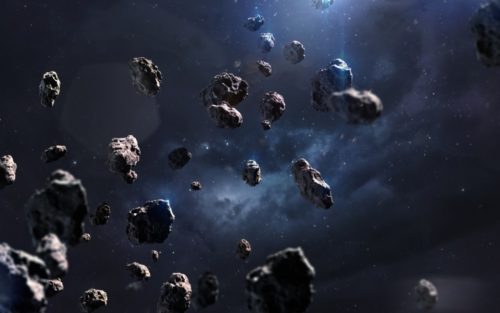Big Rocks and Rock Stars: An Unlikely Alliance Tries to Save the World

Warning: objects in space may be closer than they appear. That type of interstellar awareness stands out as a primary feature of International Asteroid Day, recognized around the world on June 30. More than 2500 events in 193 countries will mark this campaign to teach the Earth’s population about asteroids, the danger of impacts, and what communities can do to help protect the planet.
The origins of Asteroid Day come from a seemingly unlikely source: Queen guitarist Brian May. The Rock and Roll Hall of Famer also happens to hold a Ph.D. in astrophysics from Imperial College in London. As such, May was Chancellor of Liverpool John Moores University from 2008 to 2013 and was announced as a member of NASA’s New Horizons team in 2015. Even with this background, music still served as the catalyst for the celebration.
May had the opportunity to compose music for a film for director Grigorij Richters in 2014. That film, 51 Degrees North, told the tale of an asteroid strike on London and its aftermath. May urged Richters to show the film at the Starmus Festival of science communication and art. The screening kicked off discussions among a number of other prominent scientists and entertainers, which led to May introducing Richters to the B612 Foundation, an American non-profit that deals with early asteroid detection. The outcome of all these meetings was the formation of Asteroid Day, with the four official founders being May, Richters, B612 COO Danica Remy, and Rusty Schweickart, an Apollo 9 astronaut and B612 co-founder. June 30 was set as the date as it was the anniversary of the Tunguska Event in Russia in 1908, an explosion attributed to a meteoroid crash that wiped out 770 square miles of forest.
Sarah Brightman and Brian May will be among the dozens of notables joining Professor Brian Cox on the Asteroid Day LIVE Broadcast. (Via AsteroidDay.org)
This year, the United Nations-sanctioned program will combine live events around the world with the Asteroid Day LIVE broadcast from its website. That will be hosted by Professor Brian Cox and a number of other experts and celebrities. Official events in the United States include Asteroid Awareness Day at the Museum of Flight in Seattle, Space Rock! at the Fernbank Science Center in Atlanta, and more than a dozen others.
If you were skeptical that the effort to raise asteroid awareness was all rock stars and Armageddon fantasists, note that NASA and the ESA (European Space Agency) just confirmed plans for a co-operative asteroid deflection mission. The DART (Double Asteroid Redirection Test) is set for 2022, and involves the controlled crash of a spacecraft into the Didymos asteroid in an effort to test if its course can be effectively altered.
Matt Brady, science teacher and co-creator of TheScienceOf.org, explains why events like Asteroid Day and the NASA/ESA mission are necessary. He says, “The bad thing about asteroids is that movies and television have given us these big ideas of last-minute saves or plans that can limit the damage. The real plans are a lot more boring and a lot more science-based, but have the potential to save us all. We’ve just got to decide, as a population, that the idea of going out like the dinosaurs is something that we really want to avoid.”